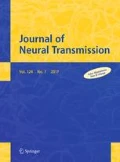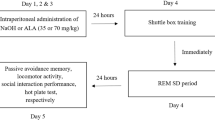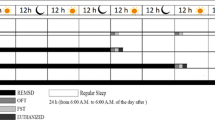Abstract
Rapid eye movement (REM) sleep is known to be essential for memory. Hence, REM sleep deprivation impairs memory processes. The frequently prescribed selective serotonin reuptake inhibitors (SSRIs) are known to cause REM sleep deprivation and to impair cognitive performance in humans and rodents. We suggested that impaired memory processes by citalopram in C57/BL6 mice could be explained by the acute inhibition of REM sleep. We hypothesized that those acute citalopram 5 and 10 mg/kg injections induced REM sleep deprivation, altered cognitive performance in passive avoidance, impaired spatial memory compared to controls. Three experiments have been realized: (1) mice received successively physiological saline, injection of citalopram 5 and 10 mg/kg and were recorded by polysomnographic recording after each injection. (2) Cognitive performance was evaluated in the passive avoidance with two groups of mice. One group received citalopram before training and one, after training. (3) Spatial learning was evaluated with another group of animals in the Y-maze test. At 5 and 10 mg/kg, citalopram delayed REM sleep onset and decreased REM sleep amounts (vs. controls). The same doses were administrated in the passive avoidance test and have significantly shortened latency to enter the dark compartment. In the Y-maze, citalopram-treated mice showed a decreased percentage of time spent in the novel arm in contrast to the two other arms compared with controls. We showed that citalopram impaired cognitive performance in behavioral tasks. Those impairments could be linked to REM sleep deprivation induced by citalopram although causal relationship needs to be investigated in further studies.



Similar content being viewed by others
References
Almeida S, Glahn DC, Argyropoulos SV, Frangou S (2009) Acute citalopram administration may disrupt contextual information processing in healthy males. Eur Psychiatry 25(2):87–91
Alvarenga TA, Patti CL, Andersen ML, Silva RH, Calzavara MB, Lopez GB, Frussa-Filho R, Tufik S (2008) Paradoxical sleep deprivation impairs acquisition, consolidation, and retrieval of a discriminative avoidance task in rats. Neurobiol Learn Mem 90(4):624–632
Archer T, Ogren SO, Johansson G, Ross SB (1984) The effect of acute zimeldine and alaproclate administration on the acquisition of two-way active avoidance: comparison with other antidepressant agents, test of selectivity and sub-chronic studies. Psychopharmacology 84(2):188–195
Armitage R, Yonkers K, Cole D, Rush AJ (1997) A multicenter, double-blind comparison of the effects of nefazodone and fluoxetine on sleep architecture and quality of sleep in depressed outpatients. J Clin Psychopharmacol 17(3):161–168
Bonaventure P, Kelly L, Aluisio L, Shelton J, Lord B, Galici R, Miller K, Atack J, Lovenberg TW, Dugovic C (2007) Selective blockade of 5-hydroxytryptamine (5-HT) 7 receptors enhances 5-HT transmission, antidepressant-like behavior, and rapid eye movement sleep suppression induced by citalopram in rodents. J Pharmacol Exp Ther 321(2):690–698
Boutrel B, Monaca C, Hen R, Hamon M, Adrien J (2002) Involvement of 5-HT1A receptors in homeostatic and stress-induced adaptive regulations of paradoxical sleep: studies in 5-HT1A Knock-Out Mice. J Neurosci 22:4686–4692
Burghardt NS, Sullivan GM, McEwen BS, Gorman JM, LeDoux JE (2004) The selective serotonin reuptake inhibitor citalopram increases fear after acute treatment but reduces fear with chronic treatment: a comparison with tianeptine. Biol Psychiatry 55:1171–1178
Carlini VP, Poretti MB, Rask-Andersen M, Chavan RA, Ponzio MF, Sawant RS, de Barioglio SR, Schiöth HB, de Cuneo MF (2012) Differential effects of fluoxetine and venlafaxine on memory recognition: possible mechanisms of action. Prog Neuropsychopharmacol Biol Psychiatry 38(2):159–167
Castellano C, Cestari V, Ciamei A (2001) NMDA receptors and learning and memory processes. Curr Drug Targets 2(3):273–283
Dellu F, Mayo W, Cherkaoui J, Moal ML, Simon H (1992) A two-trial memory task with automated recording: study in young and aged rats. Brain Res 588:132–139
Dellu F, Contarino A, Simon H, Koob GF, Gold LH (2000) Genetic differences in response to novelty and spatial memory using a two-trial recognition task in mice. Neurobiol Learn Mem 73:31–48
Denti A, Epstein A (1972) Sex differences in the acquisition of two kinds of avoidance behavior in rats. Physiol Behav 8:611–615
Diekelmann S, Born J (2010) The memory function of sleep. Nat Rev Neurosci 11(2):114–126
Fuller RW (1995) Serotonin uptake inhibitors: uses in clinical therapy and in laboratory research. Prog Drug Res 45:167–204
Göder R, Seeck-Hirschner M, Stingele K, Huchzermeier C, Kropp C, Palaschewski M, Aldenhoff J, Koch J (2011) Sleep and cognition at baseline and the effects of REM sleep diminution after 1 week of antidepressive treatment in patients with depression. J Sleep Res 4:544–551
Gruart-Masso A, Nadal-Alemany R, Coll-Andreu M, Portell-Cortès I, Martí-Nicolovius M (1995) Effects of pretraining paradoxical sleep deprivation upon two-way active avoidance. Behav Brain Res 72:181–183
Haider S, Shameem S, Ahmed SP, Perveen T, Halem DJ (2005) Repeated administration of lead decreases brain 5-HT metabolism and produces memory deficits in rats. Cell Mol Biol Lett 10:669–676
Hashimoto S, Inoue T, Muraki I, Koyama T (2009) Effects of acute citalopram on the expression of conditioned freezing in naïve versus chronic citalopram-treated rats. Prog Neuropsychopharmacol Biol Psychiatry 33:113–117
Kitahama K, Valatx JL, Jouvet M (1976) Y-maze learning in two strains of mice. Effects of instrumental and pharmacologic sleep deprivation. Brain Res 108:75–86
Laloux C, Derambure P, Jacquesson JM, Bordet R, Destée A, Monaca C (2007) The effects of serotoninergic, noradrenergic, cholinergic and dopaminergic drugs on vigilance states in MPTP-treated mice. Brain Res 1161:79–87
Li YF, Zhang YZ, Liu YQ, Wang HL, Cao JB, Guan TT, Luo ZP (2006) Inhibition of N-methyl-d-aspartate receptor function appears to be one of the common actions for antidepressants. J Psychopharmacol 20(5):629–635
Limoge-Lendais I, Robert C, Degrange M, Goldberg M, Stinus L, Limoge A (1994) Study on superbond adhesion to the skull for chronic electrode implantation in the rat. Neurosci Protocols 70:1–11
Louie K, Wilson MA (2001) Temporally structured replay of awake hippocampal ensemble activity during rapid eye movement sleep. Neuron 29:145–156
Majlessi N, Naghdi N (2002) Impaired spatial learning in the morris water maze induced by serotonin reuptake inhibitors in rats. Behav Pharmacol 13:237–242
Martella D, Plaza V, Estévez AF, Castillo A, Fuentes LJ (2012) Minimizing sleep deprivation effects in healthy adults by differential outcomes. Acta Psychol (Amst) 139(3):391–396
Masand PS, Gupta S (1999) Selective serotonin-reuptake inhibitors: an update. Harv Rev Psychiatry 7(2):69–84
Meneses A (1999) 5-HT system and cognition. Neurosci Biobehav Rev 23:1111–1125
Monaca C, Boutrel B, Hen R, Hamon M, Adrien J (2003) 5-HT 1A//1B receptor-mediated effects of the selective serotonin reuptake inhibitor, citalopram, on sleep: studies in 5-HT 1A and 5-HT 1B knockout mice. Neuropsychopharmacology 28:850–856
Silva RH, Chehin AB, Kameda SR, Takatsu-Coleman AL, Abílio VC, Tufik S, Frussa-Filho R (2004) Effects of pre- or post-training paradoxical sleep deprivation on two animal models of learning and memory in mice. Neurobiol Learn Mem 82:90–98
Slipczuk L, Tomaiuolo M, Garagoli F, Weisstaub N, Katche C, Bekinschtein P, Medina JH (2012) Attenuating the persistence of fear memory storing using a single dose of antidepressant. Mol Psychiatry (in press)
Thaler KJ, Morgan LC, Van Noord M, Gaynes BN, Hansen RA, Lux LJ, Krebs EE, Lohr KN, Gartlehner G (2012). Comparative effectiveness of second-generation antidepressants for accompanying anxiety, insomnia and pain in depressed patients: a systematic review. Depress Anxiety 29(6):495–505. doi:10.1002/da.21951
Tobler I, Deboer T, Fischer M (1997) Sleep and sleep regulation in normal and prion protein-deficient mice. J Neurosci 17:1869–1879
Valatx JL, Bugat R (1974) Genetic factors as determinants of the waking-sleep cycle in the mouse. Brain Res 69(2):315–330
Yang RH, Hu SJ, Wang Y, Zhang WB, Luo WJ, Chen JY (2008) Paradoxical sleep deprivation impairs spatial learning and affects membrane excitability and mitochondrial protein in the hippocampus. Brain Res 1230:224–232
Conflict of interest
None.
Author information
Authors and Affiliations
Corresponding author
Rights and permissions
About this article
Cite this article
Bridoux, A., Laloux, C., Derambure, P. et al. The acute inhibition of rapid eye movement sleep by citalopram may impair spatial learning and passive avoidance in mice. J Neural Transm 120, 383–389 (2013). https://doi.org/10.1007/s00702-012-0901-0
Received:
Accepted:
Published:
Issue Date:
DOI: https://doi.org/10.1007/s00702-012-0901-0




